Solving the Confusion over The Days celebrating Easter and Passover
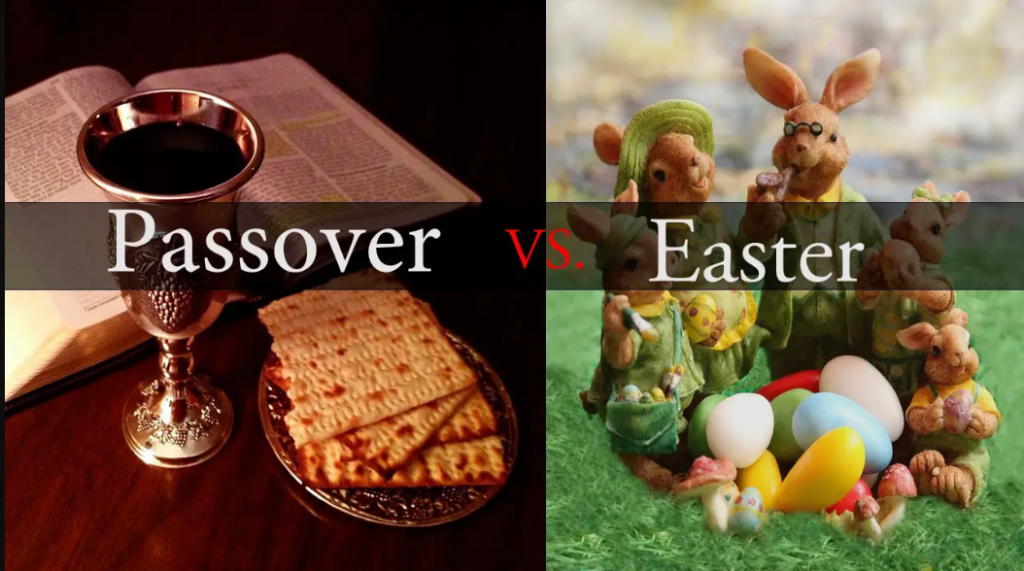
Sometimes, the celebration dates of Passover and Easter coincide, but sometimes they can be weeks apart. Why is this? If Yeshua died at the time of the Jewish Passover, why does the institutionalized Christian church celebrate his death and resurrection on a different date of the year? How did they get separated?
[Thanks to my Source for today’s episode: “Why Does Easter Come Before Passover?” posted on 12/12/2023 by Larry https://messianiclight.com/why-is-easter-before-passover/ Also see: https://www.oneforisrael.org/holidays/why-are-passover-and-easter-celebrated-at-different-times/]
For many Christians, Easter Sunday is the annual celebration of the resurrection of Jesus Christ three days after his death. The Gospel writers are very clear that His crucifixion took place at the Jewish observance of Passover. Christians understand the prophetic symbolism of the Passover sacrifice. In fact, Paul writes that “Christ, our Passover lamb, has been sacrificed” (1 Corinthians 5:7). How is it then, that this year (2024) Easter, on March 31, occurs three weeks before Passover on April 22?
Establishing the Date for Passover
Both Easter and Passover appear to be on dates that change every year according to our modern Gregorian calendars. However, Passover is actually a fixed date on the Hebrew calendar – according to the Bible it is always on the evening of the fourteenth day of the first month (Leviticus 23:5 and others). The date never changes; it is always the same. We just need to know when it is the first Hebrew month.
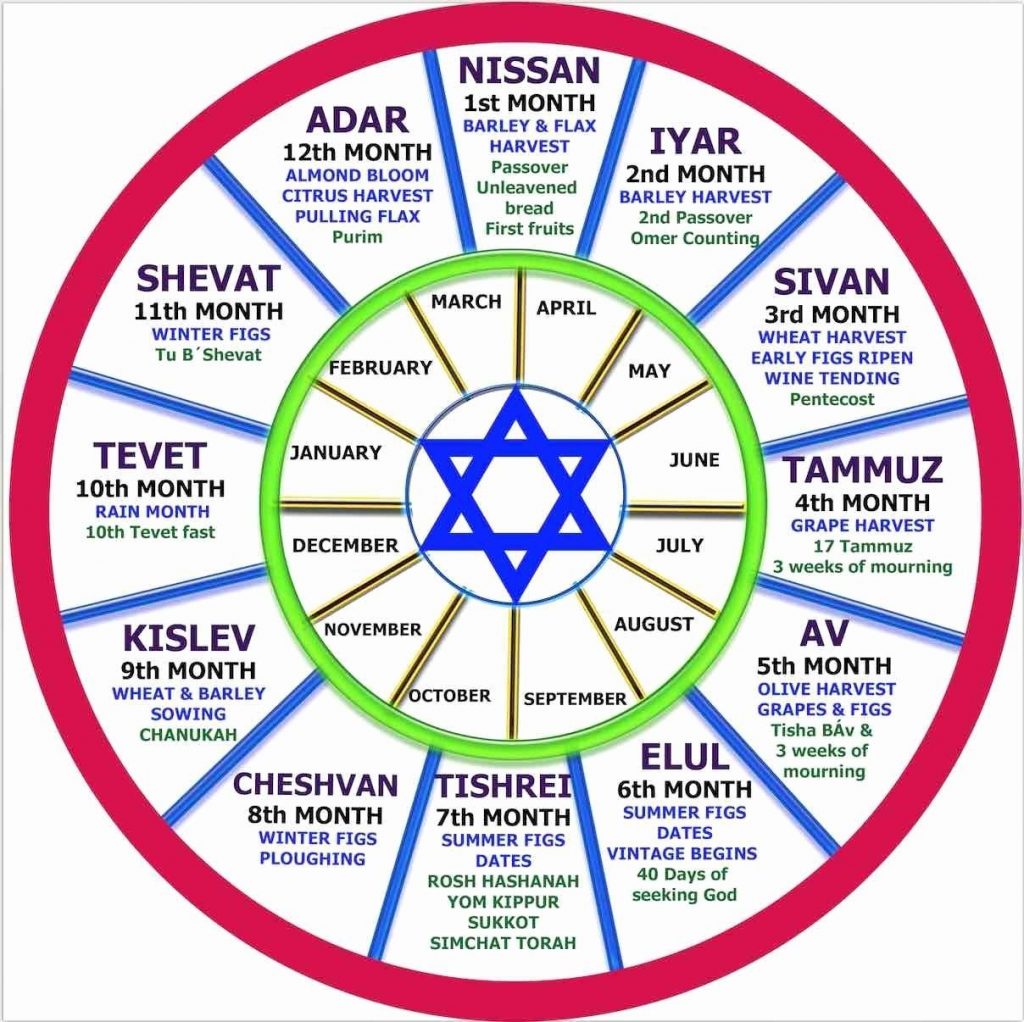
In the Jewish community, this is not an issue. In the fourth century AD, a calculated calendar system was developed, attributed to Rabbi Hillel II, establishing the months of the Hebrew calendar. The month for Passover must be in the spring of the year, but a year of twelve lunar months only consists of about 354 days while the cycle of the sun, determining the seasons, is about 365 days. To compensate for this discrepancy and to keep all of the Biblical festivals in their correct agricultural season, the Hillel calendar uses a system of adding a “leap month” about every three years.
It may sound a little odd, but since the Jewish calendar begins with the seventh month and ends with the following sixth month, the thirteenth “leap month” actually occurs in the middle of the Jewish year, right before the first month and Passover. According to the calendar, this year of 5784 will be a leap year with a leap month. That means that all the remaining months in the year 5784 will seem later when compared to the Gregorian calendar.
According to the encyclopedia Britannica, the Gregorian calendar, solar dating system, that is now in general use, was proclaimed in 1582 by Roman Catholic Pope Gregory XIII as a reform of the Julian calendar. The Gregorian calendar differs from the Julian only in that no century year is a leap year unless it is exactly divisible by 400 (e.g., 2000). Nearly all Eastern Orthodox churches still use the Julian calendar to establish the dates of movable feasts such as Easter. The current discrepancy between the Julian and Gregorian calendars is 13 days. However, the difference will become 14 days in 2100.
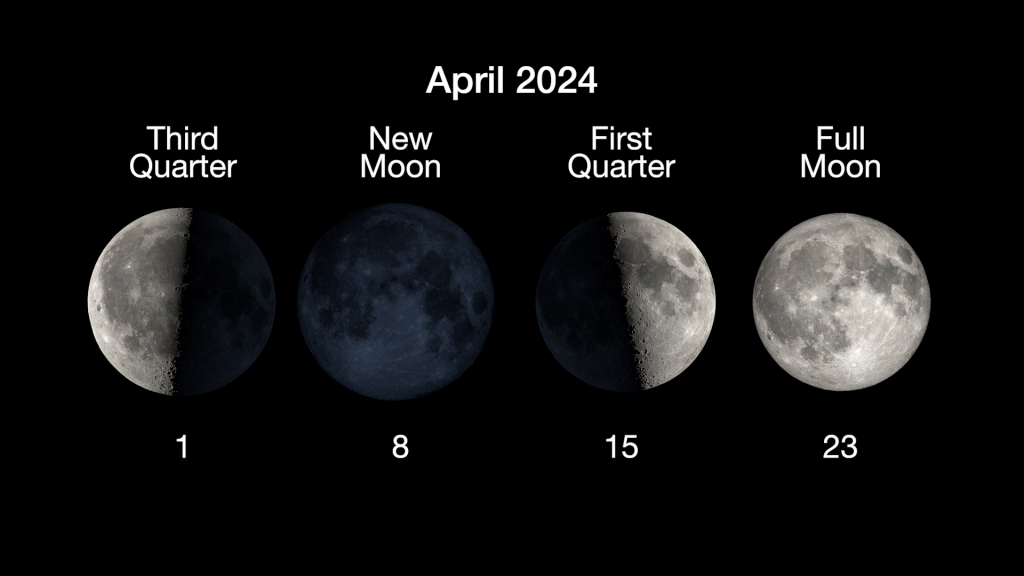
Does this seem Confusing? Maybe. Among those pursuing a Biblical faith there is considerable debate. The calendar is one of the two most passionately contested controversies in this movement. And since the Bible doesn’t specifically say “this is how you know it is the first day of the first month of the year,” various interpretations of Biblical and extra-Biblical texts have led to a number of proposed methods. It is not my intention here to defend one over the other. Just know that, according to the Torah, the date for Passover is fixed as the fourteenth day of the first month. And that first moon-month began on the day of the new moon in the springtime of the year when the Exodus of God’s people called Israel happened in Egypt, about 3500 years ago.
Establishing the Date for Easter
The timing of Easter does, in fact, vary from year to year on our calendar. Easter is not mentioned in the Bible. (Acts 12:4 in the King James Version is a well-known mistranslation of the word Pascha, correctly rendered as Passover in nearly all other translations, as well as all the other 28 times that the word appears in the New Testament).
After the destruction of Jerusalem in AD 70, the Jerusalem Council of apostles and bishops began to lose their authority as moderator of the expanding Christian faith and the guardian of church traditions. Church authority began to shift westward to Rome, the capital of the Empire. This transition was completed in the aftermath of the failed Second Jewish Revolt against Rome in AD 132-135. That ended the long line of Jewish-Christian leadership that began in Jerusalem, influencing the eastern churches of Asia Minor in the east. By the end of the second century, a controversy arose that pitted the western churches around Rome against those of the east. On which day was it most appropriate to commemorate the resurrection?
Easter began to be instituted after the final collapse of Jewish influence in AD 135. In AD 155 Polycarp (AD 69-156) Bishop of Smyrna and disciple of the Apostle John, strongly holding to the Biblical pattern of celebrating the Levitical feasts, met in Rome with Anicetus, Bishop of Rome, to resolve this controversy. Neither would budge from his position and it is reported by Eusebius that Irenaeus (ca. AD 125-202), Bishop of Lyon and a student of Polycarp got them to peacefully agree to disagree. Those who maintained the Passover evening celebration were mainly the original churches founded by the Apostles. As the second century generation passed, the eastern churches refused to give in to Roman influence, insisting that they would keep the Passover tradition of the Apostles. Victor, the Bishop of Rome, attempted to excommunicate them. Around AD 190 Victor attempted to standardize the celebration of the resurrection around Easter. In 325AD, Roman Emperor Constantine convened the Council of Nicaea where the date for Easter was set as the Sunday following the full moon following the Spring equinox. (see: https://www.jewishawareness.org/passover-easter-and-the-early-church/)
So, whatever their motivation, the Roman bishops influenced the western churches to celebrate Easter according to the day of the week rather than the date of the month. According to their reckoning, by prioritizing the days they could then have Good Friday, Holy Saturday, and Easter Sunday every year.
Yet, even that is not without controversy. The equinox used in this method is not based on astronomical observance. It was determined to always be March 21, while the full moon is 14 days after the new moon. The disagreement between the Roman church and the Eastern church led to them observing different dates for Easter Sunday almost 75% of the time. In fact, in 2024 the Roman church is observing Easter on March 31 while the Eastern church is observing it on May 5 (which still does not seem to relate to Passover).
There’s no doubt that the word “Easter” comes from a pagan celebration. It is true that “Ostara,” one of the eight annual pagan holidays, occurs at the vernal (spring) equinox, and that this is associated with fertility, the practice of coloring eggs, and myths about rabbits and eggs. However, the date selected to celebrate the resurrection of Jesus by the Nicaean Council – the first Sunday after the full moon after the equinox – has no direct connection to any pagan history. Certainly, no Christian who gathers for a sunrise service on Easter is either knowingly or unknowingly paying homage to the invincible sun god or the goddess of fertility. It is a sincere celebration by Christians to honor their risen Savior.
The Underlying Reason
The reason behind the Council of Nicaea deciding on the date for celebrating the resurrection runs far deeper than simply adapting a Christian meaning to an already existing pagan festival. The timing was already clear in the Gospel accounts: It was the first day of the week following Passover. But in the fourth century the Roman church under Emperor Constantine made a conscious decision to divorce itself from anything Jewish. This Council set a new foundational date for Easter, out of which would eventually come a liturgical calendar including Good Friday, Maundy Thursday, and a full Passion Week beginning with Palm Sunday. Yahweh’s appointed times of Passover, the Feasts of Unleavened Bread and First Fruits, were no longer deemed important.
The ministry called “One For Israel” posted a very helpful, researched and footnoted article ( https://www.oneforisrael.org/holidays/why-are-passover-and-easter-celebrated-at-different-times/) pointing out …
HOW THE SPLIT OCCURRED
In the first centuries after Yeshua, the early disciples naturally remembered his death and resurrection every Passover, which was when it happened. And rightly so, since the Passover feast was designed from its outset to foretell the redemptive sacrifice of the Messiah. It is laden with symbolism all pointing to Yeshua, and how his death and blood would purchase our freedom, forcing death to “pass over” us as it did for the faithful Israelites who daubed the blood of the lamb on their door frames. But as the years went by, the Messianic community of Jews became increasingly dominated by Gentiles. Gentile leaders grew weary of depending upon the rabbinic authorities for the right date on which to commemorate this important event. Relations between the Rabbinic Jewish community and the Christians had deteriorated significantly by this point, and there was a lot of hostility in both directions. Finally, after over 200 years, the Western church leaders in Rome decided, at the Council of Nicaea in 325AD, to take matters into their own hands:
Here is what they wrote at the time, according to the ancient historian, Eusebius, in his [2] Letter of the Emperor to all those not present at the Council: (Vita Const., Lib. iii., 18-20) See if you can hear the bitterness in the fracture of those church leaders of the time.
“It was declared to be particularly unworthy for this, the holiest of all festivals, to follow the custom [the calculation] of the Jews, who had soiled their hands with the most fearful of crimes, and whose minds were blinded. In rejecting their custom, we may transmit to our descendants the legitimate mode of celebrating Easter…
We ought not, therefore, to have anything in common with the Jews, for the Savior has shown us another way…. We desire, dearest brethren, to separate ourselves from the detestable company of the Jews.”2
Eusebius, in his [2] Letter of the Emperor to all those not present at the Council: (Vita Const., Lib. iii., 18-20)
If these words are not shocking to you, they should be! The Nicaean Council decided that they would celebrate a separate festival on the first new moon after the Spring Equinox (the Spring Equinox is always March 21st in the Gregorian Calendar) to make a deliberate break with the people of Israel.
It bears reiterating that Easter is not found in the Bible even once. Again, the King James Version erroneously translates the word Pascha (from the Aramaic for Passover) to Easter in Acts 12:4. The English word “Easter” comes from “Eostre”, and was co-opted for the name of the new festival to celebrate the death and resurrection of Jesus—which was categorically NOT Passover.
THE IMPLICATIONS, AND THE SITUATION TODAY
It’s truly heartbreaking that such animosity developed between the Jewish and Christian communities under the domination of the Roman Empire in the 4th Century. It led to a ripping away of Yeshua’s followers from the roots of the tree that they had been grafted into. The institutional Christian religion decided to separate themselves – and all Christian people under their system – not just from the people of Israel, but also from God’s Biblical festivals. Those HOLY days (holidays) of celebration were deliberately created by God to help us appreciate more about His plan of redemption. Passover was God’s initiative. He devised each detail of it on purpose. Just because the Bible doesn’t specifically say that we are judged for not celebrating the Passover, doesn’t mean that we don’t miss out on many treasures that God placed in his word for us to learn from. It’s really more than disgraceful that the Nicaean Council decided on behalf of all Christians from that time onward that Passover had no relevance for them.
Not only were Christians cut off from the roots of their faith—their heritage, God’s own feasts, laid out in their own Bible—but also the message of Yeshua became more and more obscured and alien to the Jewish people. The church became a foreign, gentile “no-go-zone” for Jews. The two were severed apart, and the evil root of antisemitism crept into Christianity. To the discredit of the global “church” – called to be Ambassadors for Yeshua our Messiah – for much of church history, the ethnic Jewish people were persecuted, tortured and murdered at the hands of Christians for simply being Jewish. This happened especially at Easter times, when angry mobs would rage against those they considered to be “Christ killers”.3 Most Christians have no idea about the scale to which this sad statement is true—it’s not something that is taught in Sunday School or even church history classes. There is a real gap of information between the people of Israel and the church, and we’ve been separated so long that we have a lot of catching up to do!
The footnote in the article about this from “One For Israel” gives us some sad details that most of us have never heard (https://www.oneforisrael.org/holidays/why-are-passover-and-easter-celebrated-at-different-times/):
[3] “A “Yerushalmi”, i.e. someone who lived in the Old City of Jerusalem before the State of Israel was declared, once told me that in this part of the world they would barricade their doors on Easter Sunday, knowing that the traditional Christian procession would often end in rioting against the local Jews. Communal Jewish history is made up of commandments, holidays and customs, but also of this type of memory.” Rochel Sylvetsky, israelnationalnews.com, 31/12/17.
For a very brief taste of some of the horrors that have happened throughout history, see this concise chart: http://www.hearnow.org/caljp.html . For a more thorough understanding of the attitude of the church fathers towards the Jews, see this article: https://oneforisrael.org/bible-based-teaching-from-israel/has-the-church-replaced-israel/
Near the top of that list in 135AD, we learn that the Roman Emperor Hadrian proclaimed his edict against all Jews, including Messianic believers. They were forbidden to practice circumcision, the reading of the Law, eating of unleavened bread at Passover or any Jewish festival. Violating this edict meant the death penalty.
The actions of the Council of Nicaea are a continuation of the division of Israel following the idolatry of King Solomon. They divorced the church from anything Jewish.
[If you are not familiar with the separation of the two houses of Israel, you can read Larry’s series of articles here: Part 1, Part 2 and Part 3. In the previous paragraph, he intentionally used the phrase “divorced itself from anything Jewish.”]
Those of us growing up in the Christian churches have suffered the effects of that divorce for more than 1600 years – longer than the time between the exodus from Egypt and the first advent of the Messiah.
The author of our source for today’s Reclaiming Your Legacy show (Larry) quoted a profoundly pertinent observation from the book The Bridge: Crossing Over Into the Fullness of Covenant Life by Tyler Dawn Rosenquist. Listen to what she describes, that I too had never heard before.
To me, knowing the history of the fourth century CE – that Rome forcibly legislated the removal of Christians out of the synagogues and Torah keepers out of the assemblies of Messiah – Christians celebrating Christmas and Easter seem very much like children celebrating the consequences of having a broken home. Without the Christians, the Jews lost their Messiah and without the Jews, the Christians lost their inheritance. It’s like a child celebrating the absence of a parent who wasn’t even a bad parent. Christmas and Easter happened because of a broken home, and that grieves me – it doesn’t make me want to celebrate. At one point all believers in Yeshua were called Nazarene Jews, for hundreds of years – Rome robbed us of a stable home life.
The Bridge: Crossing Over Into the Fullness of Covenant Life by Tyler Dawn Rosenquist
The Apostle Peter, after healing the lame man in Jerusalem soon after the first New Testament “Day of Pentecost,” charged his listeners to repent. Then he said that “Jesus, the Christ” is “appointed for you, whom heaven must receive until the period of “restoration of all things” (Acts 3:21).
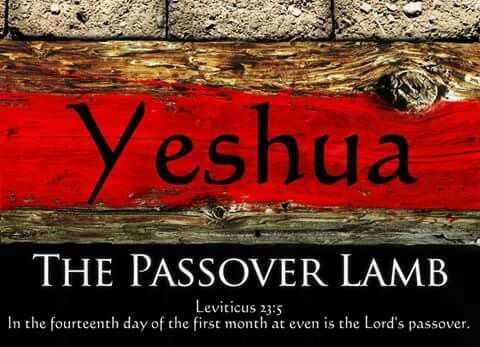
It seems that a measure of that restoration is taking place in our day. The followers of Yeshua (Jesus) are returning to “the faith which was once for all handed down to the saints” (Jude 3). There was no Easter when those words were penned. The disciples observed the appointed times of God, established in His Torah (as the Moedim), that you can read about in Leviticus chapter 23.
As we get back to honoring this today, the man-made/church-made holidays that replaced God’s “appointed times” (Moedim or ‘seasons’) become less and less significant, sometimes even repulsive. For some, the transition is quick and easy. For others, it may be more difficult and take a little longer. The Holy Spirit will deal with those who are seeking truth, and it is not necessary for us to “help” in ways that too often come across as harsh or condemning.
This year, 2024, Passover on the Jewish calendar happens three weeks after the Christian Easter. Why? Because historically the Christian church has rejected the Hebraic roots of the faith. We do not advocate for the correctness of either date; I am only pointing out that this year the Gospel story reflected in these celebrations is out of order. It will happen again in 2027, then not again until 2035. This year, questions will be raised, and we need to have answers – answers that draw us and those we talk with into a deeper walk, a deeper obedience, and a deeper relationship with the Messiah. It’s time to end the division and seek restoration and reconciliation.
Another big confusion that resulted from the dictates of Roman church bishops in the fourth century is about the introduction of “Good Friday.”
It’s natural to celebrate Jesus’ resurrection, but the idea of a Friday crucifixion is a major incorrect tradition that was established by the Roman institutional church.
The following graphic is from 119 Ministries. They have an essay about this at: https://www.119ministries.com/119-blog/good-friday-is-a-myth/
Also see video: https://www.119ministries.com/teachings/video-teachings/detail/moedim-passover-and-unleavened-bread/
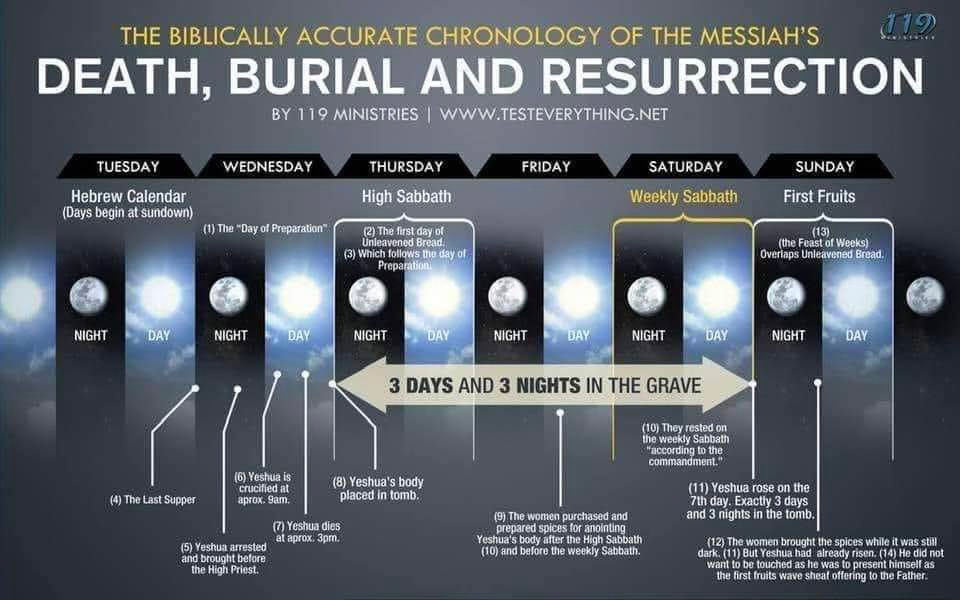
Most of us in modern church traditions have been unknowingly influenced by much lack of knowledge of historical and cultural backgrounds. It’s unfortunate that many well-meaning evangelicals take such hard positions without being Bereans to “test all things” and realize we all suffer from a “lack of knowledge” in many areas. Our opinions must not be presented as ‘dogmas’ when careful diligence in research exposes glaring inconsistencies that can make our positions embarrassing. Jesus meant exactly what He said in Matthew 12:40. Three days and three nights can never mean only one full day and two nights.
JEWS AND GENTILES DRAW TOGETHER IN YESHUA
We live in exciting days. The last century has seen some colossal steps forward in healing the terrible rift between Jews and Gentiles. Christian ministries to Jews report that more Jewish people have come to believe in Yeshua as Messiah in the last 19 years than in the previous 19 centuries combined! Remarkably, many Gentile believers are now taking more interest in the Jewish foundations of their faith. Many churches now hold Passover seders, explaining more about the Biblical Feast of Unleavened Bread, beginning with Passover, and ending with the feast of First Fruits. There has been much more appreciation of the people of ethnic and religious Israel since the Bible became widely translated and published in the last few centuries.
We are destined to become “One New Man” in Messiah, and this is a destiny at which God will make absolutely sure that we arrive. His Son, Yeshua, will have only one bride, not two! It’s important to remember what Yeshua’s death and resurrection actually accomplished and meant. As Paul urges us in his letter to the gentile church in Colossae… (Colossians 2:14-17)…
“When you were dead in your sins and the uncircumcision of your flesh, God made you alive, together with Him, when He pardoned us all our transgressions. He wiped out the handwritten record of debts with the decrees against us, which was hostile to us. He took it away by nailing it to the cross. After disarming the principalities and powers, He made a public spectacle of them, triumphing over them in the cross.
Therefore, do not let anyone pass judgment on you in matters of food or drink, or in respect to a festival or new moon or Shabbat. These are a foreshadowing of things to come, but the reality is Messiah.”
Colossians 2:14-17
See the Reclaiming Your Legacy episode, “Since Christ is Our Passover why do Christians celebrate Easter?” at https://reclaimyourlegacy.com/2024/03/30/since-christ-is-our-passover-why-do-christians-celebrate-easter/. There are some long held secrets, waiting to be discovered in what is shared in that broadcast. Listen closely because we’re exploring several “caverns” of Bible History that most of our Christian peers have never heard before in their lives.
… … …
Some thoughts on “Why Does Easter Come Before Passover?”
The Rabbinic Jewish calendar has a slight solar drift that causes it, in 3 years out of every 19, to set Unleavened Bread at the second full moon after the equinox. This year, 2024, is one of those years. Meanwhile the Gregorian lunar calendar sets Eastertide to the first full moon after the equinox where, according to Josephus, Passover was celebrated in the 1st century.
Eastern Orthodox Christian’s Pascha is always after Passover. It is part of the formula and the use of the Julian Calendar.

Please note: I reserve the right to delete comments that are offensive or off-topic.